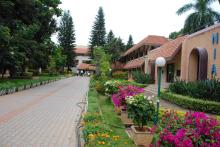
Abstract: There are two robust sources for the Indian Knowledge System (IKS)- textual and archaeological. The textual sources have been used by some Sanskrit scholars to dig deep into the information on traditional knowledge system in the country. A large number of archaeological sites, ranging in age from Paleolithic to the Late Medieval/Colonial periods, excavated in different parts of the country, have generated ample evidence regarding the origin and development of the IKS. The genesis of the Indian Knowledge System is indigenous and goes back to the beginning of settled life in South Asia around 7000 BCE. A gradual growth is evident from 7000 BCE to the emergence of the Harappan urbanization (Mature Harappan or Harappan Civilization phase) in the middle of the third millennium BCE when all the basic technologies and sciences were perfected. Such was the perfection achieved that the wisdom and knowledge that the Harappans generated is found relevant even today and it continues till date in many parts of South Asia and beyond. The people responsible for the development of IKS were indigenous. Based on genetic chronology at Rakhigarhi a distinct South Asian ancestry developed around 12000 years ago and the subsequent population till date carried this South Asian gene, suggesting a genetic continuity for the last 12000 years. Of course, right from the beginning of the settled life there has been a mixing of populations from different regions due to trade links, which is clearly reflected in the archaeological as well as genomic data. For the first time, the 3D reconstruction of a Harappan male and female at Rakhigarhi is achieved. New research on archaeogenetic and craniofacial reconstruction will have tremendous scope in future and should be pursued rigorously.
About the speaker: Prof. Vasant Shinde is a globally recognized archaeologist and museum expert, currently a CSIR Bhatnagar Fellow at the Centre for Cellular and Molecular Biology (CCMB), Hyderabad. He is the former Vice-Chancellor of Deccan College, Pune, and was the Founding Director General of the National Maritime Heritage Complex and Museum, Lothal. With over 44 years of experience, Prof. Shinde is a prominent researcher in Protohistoric South Asia, Maritime History, and Field Archaeology.
He has completed 16 major research projects, collaborating with prestigious institutions such as the Universities of Pennsylvania, Cambridge, Oxford, and research centres in Japan and South Korea. Prof. Shinde directed the internationally acclaimed excavation at Rakhigarhi, India's largest Harappan site, and has led numerous other excavations across India.
Prof. Shinde has published 13 books, and over 200 research papers, and contributed to the groundbreaking DNA analysis and craniofacial reconstruction of Harappan people, recognized as a major breakthrough in 2019. He has delivered more than 500 lectures in India and abroad, advancing Indian archaeology on the global stage.
He also founded the Society of South Asian Archaeology (SOSAA) to support young scholars and promote international collaboration. Throughout his career, Prof. Shinde has actively engaged in public archaeology, working to protect and raise awareness of India's cultural heritage.
